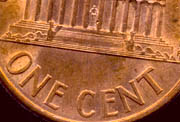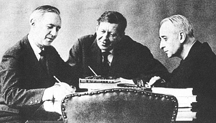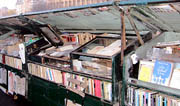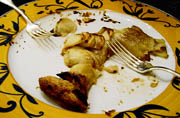|
|
 Frank Rich gets it right more often than not, and his column in the Times last Sunday swept the entire decade into a neat little dustpan and dumped it in the garbage. His insight is that Tiger Woods is truly the person of the decade, a fraud capping a decade of frauds that started with Enron, wound its way through a phony war, went broke with phony financiers, and concluded with a phony hero. Fortunately Rich concluded with a spiritual and uplifting conclusion that, at least for me, had me singing on the way out of the theatre. Frank Rich gets it right more often than not, and his column in the Times last Sunday swept the entire decade into a neat little dustpan and dumped it in the garbage. His insight is that Tiger Woods is truly the person of the decade, a fraud capping a decade of frauds that started with Enron, wound its way through a phony war, went broke with phony financiers, and concluded with a phony hero. Fortunately Rich concluded with a spiritual and uplifting conclusion that, at least for me, had me singing on the way out of the theatre.
Actually, in the spirit of Rich’s phony decade, I lied about that last part. There was no happy conclusion to his piece. But it caused me to keep wondering — why are we so untethered? What happened to the basic judgment of a previously sensible people?
Authors swim in the memes of the times. If there are strong currents, we go with them and occasionally bring understanding to the great issues of the day. But when we are surrounded by eddy currents, we too find ourselves stuck in little currents, unable to find the great tide that, as Shakespeare said, “When taken at the flood, leads on to fortune.”
Before the era when the N.Y.Times was distributed to its printers around the country electronically, all of the papers were printed in and around Manhattan. On any Sunday, airplanes would leave New York, weather permitting, and the massive bundles would spread out across the country, bringing a measure of coherency to many of the major memes that flowed through the culture. At the very least, the Times provided a sensible, apparently complete view of what had happened in the past week. And it also provided an agenda for the near future.
Later, the roll-out of the Sunday Times became almost simultaneous and national. On the West Coast, that meant our Sundays could start earlier. We were even more in sync with New York. That phase has mysteriously eroded away with the onset of the Internet. That steady weekly pulse of the Sunday Times has given way to a continuous flow of information from an infinite number of sources. The Times as authority has been drowned out. No institution has taken its place.
We find ourselves in a new Wild Wild West, and, as predicted, the snake oil salesmen are having a grand time of it —those rubes will believe anything and buy anything. We might take some comfort in remembering what came next: newspapers arrived in those frontier towns, courageous reporters, editors and publishers began to shine a light on the forces of corruption and to rally public opinion on the side of good (sometimes.) The towns eventually hired sheriffs, and built jails. Judges rode the circuit and dispensed justice.
Fortunately, order will prevail over the current chaos. Visionary and courageous publishers in all media will invest mightily to make the most of the new opportunities. A New New York Times, either on the ashes of the old or a new enterprise altogether, will arise. Out of the sheer force of brilliant and persistent reporting, deep commentary, and visionary leadership, the nation will find its way once again. Memes will cohere, and authenticity will once again be the currency of the culture. That’s the way it’s going to be. Really. Trust me.
 If you read the N.Y.Times in its coverage of the disruption of the Kindle, you might think that publishers are losing a fortune from the sudden rise in Kindle sales. If you read the N.Y.Times in its coverage of the disruption of the Kindle, you might think that publishers are losing a fortune from the sudden rise in Kindle sales.Actually, the opposite is true. Amazon is buying Kindle rights from publishers at the same price they’re paying for physical books. And Amazon is sticking with its policy to sell Kindle books at no more than $9.99. So take your average $20 list price hardcover book (if I were a shameless self-promoter, I would use my book The Genius Machine as an example, since it also has a list price of $20. But I will resist the temptation.) The publisher sells it to Amazon for 50% off, or $10. Amazon could sell my the book for $20, but they discount it down to $13.57, and make a profit of $3.57, or maybe a little less if Amazon is paying for shipping. Continue reading Can We Have A Little Chat About Money?
 Search and advertising giant Google and Ohio Art, maker of the children’s classic drawing toy announced a joint venture today to produce the first e-book reader for pre-schoolers. Named the Etch a Book, the new reader will capitalize on the highly refined Etch a Sketch two knob interface which is already familiar to millions of parents and children all over the globe. Search and advertising giant Google and Ohio Art, maker of the children’s classic drawing toy announced a joint venture today to produce the first e-book reader for pre-schoolers. Named the Etch a Book, the new reader will capitalize on the highly refined Etch a Sketch two knob interface which is already familiar to millions of parents and children all over the globe.
In making the announcement, Sergey Brin, co-founder of Google, revealed that Google has been scanning children’s literature of all kinds for several years now, accumulating a library of more than 2,000,000 children’s titles, many of which have been out of print for decades. Continue reading Etch a Sketch and Google Announce E-Book for Kids
Calling in those McKinsey folks to review your profit and loss numbers in the middle of the deepest recession since the 1930s is a little like having Dr. Kevorkian over to offer a second opinion.
“No, really, I’m feeling fine. Just a little touch of the flu.”
“Not at your age. You know, if you were a new publication, you might pull through. But Harold started you back in 1925. That’s a long, long haul for a weekly. But look on the bright side: it’s been a good run.”
When Si Newhouse decided that Gourmet was wearing a Do Not Resuscitate bracelet this week, a great many people were stunned. My wife even called Condé Nast to leave a message for Mr. Newhouse, but the switchboard said there was no way to leave a message for the boss. Maybe that’s the way it is when you’re the emperor. You can begin to feel as if you don’t need to listen to anyone, even your customers. And I guess that’s true. Continue reading Is the New Yorker on S.I. Newhouse’s DNR List?
 When I was involved with …and Ladies of the Club a few eons ago I received an offer for the audio rights for the book. This was to be a condensed version, since the book was more than 1000 pages long. I asked for a sample script from the audio producer, and it turned out to run some 75 pages. You had to laugh. Gone were the inner lives of the two principal characters. Gone was the story of the fifty years of the development of the U.S. from the Civil War to the Depression. Gone were the discussions of ideas. Left was the barest shell of the events of the novel. Anyone buying the tape would have been defrauded, believing they were about to hear anything that resembled this masterpiece. We declined the offer. When I was involved with …and Ladies of the Club a few eons ago I received an offer for the audio rights for the book. This was to be a condensed version, since the book was more than 1000 pages long. I asked for a sample script from the audio producer, and it turned out to run some 75 pages. You had to laugh. Gone were the inner lives of the two principal characters. Gone was the story of the fifty years of the development of the U.S. from the Civil War to the Depression. Gone were the discussions of ideas. Left was the barest shell of the events of the novel. Anyone buying the tape would have been defrauded, believing they were about to hear anything that resembled this masterpiece. We declined the offer.
Screenplays are similar. No matter how long the original novel, a screenplay is, with few exceptions, not going to be longer than 125 pages. A screenplay is double-spaced, descriptive paragraphs honed down to nothing, and lots of space taken up by the character’s names before their speeches. Bob. (line break) “You know what I’m thinking?” (line break) Jim. (line break) “No. What?” (line break) Bob stirs the campfire. (line break) Bob. (line break) “There’s something out there in the dark.” (line break) In a screenplay, you’ve just eaten up almost half a page. Continue reading Stinkoread, And The New Complete Theory of Peak Book
 My mother was a live book reviewer in Cleveland, an activity that seems to have gone the way of the traveling magic lantern lecture tent show. Fortunately for Mom, the traffic lights in our community were exceedingly slow, and she always had a book by her side. We joked that she had completed War and Peace just by judicious use of her time at red lights. My mother was a live book reviewer in Cleveland, an activity that seems to have gone the way of the traveling magic lantern lecture tent show. Fortunately for Mom, the traffic lights in our community were exceedingly slow, and she always had a book by her side. We joked that she had completed War and Peace just by judicious use of her time at red lights.
Book reviewers were prime entertainment at women’s organizations until somewhere around the late 1960s, possibly replaced by book clubs where everyone was supposed to actually read the book for themselves. Until then, the job of the book reviewer was to bring the ideas in important books to life for a whole community, to put it into context, to enrich the listener. The expectation that most of the audience would rush out and purchase the book, as Oprah’s audience does today, was not there. With a good book reviewer, you didn’t need to do any stinking page turning yourself. Continue reading The Failure of Filters — Why We’re Getting Dumber by the Hour
 Oh to sing the joys of Sunday morning with the NY Times Book Review section, where we can discover which books are going to get their second Times review. This morning the winner was E.L. Doctorow’s novelistic treatment of the hoarding Collyer brothers, a story apparently of immense import to the editors of the Times. Our first indication that Doctorow was about to get a Full Friedman wasn’t Michiko Kakutani’s review in the daily Times on August 31st. No, it was the PR-generated almost completely coincidental At Home with E.L. Doctorow by Steven Kurtz that ran in the Times on September 2nd with a lovely photo revealing to our great relief that the Doctorow home, unlike the Collyers’, is incredibly neat. Oh to sing the joys of Sunday morning with the NY Times Book Review section, where we can discover which books are going to get their second Times review. This morning the winner was E.L. Doctorow’s novelistic treatment of the hoarding Collyer brothers, a story apparently of immense import to the editors of the Times. Our first indication that Doctorow was about to get a Full Friedman wasn’t Michiko Kakutani’s review in the daily Times on August 31st. No, it was the PR-generated almost completely coincidental At Home with E.L. Doctorow by Steven Kurtz that ran in the Times on September 2nd with a lovely photo revealing to our great relief that the Doctorow home, unlike the Collyers’, is incredibly neat.
For the last few years I have ever-so-slowly come to realize that if someone at the Times thinks your book ought to enter the zeitgeist, you get a second review — like the one that ran this morning with even more pictures of the Collyers’ dump. Thank you Michiko. I wasn’t sure I wanted to read about the hoarding brothers with that first review, or even the up-close story about Doctorow, but with that third review, you’ve hammered it home. I give up. No more reviews! I’ll buy the book!
Like hell. Continue reading Michiko Kakutani Is Destroying The Fabric Of American Culture

You’re third in line for takeoff, finally ready to depart La Guardia and get to your lunch meeting in Chicago. The pilot comes on the P.A. for a last-minute cheery message: “Thanks for your patience. We hope to make it up once we’re in the air and get you to O’Hare on time. Or at least someplace not too far from there. We’re thinking maybe Gary or Indianapolis. As the President says, we shouldn’t make the perfect the enemy of the essential. So wish us luck.”
What if that were acceptable? What if we never got where we were hoping to go, and it was okay?
What are the implications when President Obama tells us that part of his philosophy is, “We shouldn’t make the perfect the enemy of the essential?” Sounds reasonable, in a way. Don’t want to be a perfectionist about everything. Wouldn’t be realistic. Never get anything done. Got to compromise, make a deal. Make progress of some kind.
I’m not so sure about throwing the perfect overboard. Continue reading Why Start With The Perfect?
 In the golden days of radio the great symphony orchestras of the world broadcast over short and long wave bands, creating pockets of listeners all over the globe. In isolated Japan in the 1940s the young composer Toru Takemitsu learned the ways of Western music from the Armed Forces radio network. In Maine, Charles Ives listened to the premiere of his 2nd Symphony, conducted by Leonard Bernstein, over the radio. In the golden days of radio the great symphony orchestras of the world broadcast over short and long wave bands, creating pockets of listeners all over the globe. In isolated Japan in the 1940s the young composer Toru Takemitsu learned the ways of Western music from the Armed Forces radio network. In Maine, Charles Ives listened to the premiere of his 2nd Symphony, conducted by Leonard Bernstein, over the radio.
When FM came in after the Second World War, sound quality improved, but the since the range of FM is limited to line-of-sight, those millions of listeners lucky enough to get an ionosphere bounce from New York to Vermont or Chicago to Colorado were left in silence. The advent of the long-playing record took the thrill and necessity away from live broadcasts, and radio audiences shrank.
Then came the golden age of television, Continue reading The Third Golden Age Begins?: Welcome to the Berliner Philharmoniker
|
|
 Frank Rich gets it right more often than not, and his column in the Times last Sunday swept the entire decade into a neat little dustpan and dumped it in the garbage. His insight is that Tiger Woods is truly the person of the decade, a fraud capping a decade of frauds that started with Enron, wound its way through a phony war, went broke with phony financiers, and concluded with a phony hero. Fortunately Rich concluded with a spiritual and uplifting conclusion that, at least for me, had me singing on the way out of the theatre.
Frank Rich gets it right more often than not, and his column in the Times last Sunday swept the entire decade into a neat little dustpan and dumped it in the garbage. His insight is that Tiger Woods is truly the person of the decade, a fraud capping a decade of frauds that started with Enron, wound its way through a phony war, went broke with phony financiers, and concluded with a phony hero. Fortunately Rich concluded with a spiritual and uplifting conclusion that, at least for me, had me singing on the way out of the theatre. If you read the N.Y.Times in its coverage of the disruption of the Kindle, you might think that publishers are losing a fortune from the sudden rise in Kindle sales.
If you read the N.Y.Times in its coverage of the disruption of the Kindle, you might think that publishers are losing a fortune from the sudden rise in Kindle sales.
 When I was involved with …and Ladies of the Club a few eons ago I received an offer for the audio rights for the book. This was to be a condensed version, since the book was more than 1000 pages long. I asked for a sample script from the audio producer, and it turned out to run some 75 pages. You had to laugh. Gone were the inner lives of the two principal characters. Gone was the story of the fifty years of the development of the U.S. from the Civil War to the Depression. Gone were the discussions of ideas. Left was the barest shell of the events of the novel. Anyone buying the tape would have been defrauded, believing they were about to hear anything that resembled this masterpiece. We declined the offer.
When I was involved with …and Ladies of the Club a few eons ago I received an offer for the audio rights for the book. This was to be a condensed version, since the book was more than 1000 pages long. I asked for a sample script from the audio producer, and it turned out to run some 75 pages. You had to laugh. Gone were the inner lives of the two principal characters. Gone was the story of the fifty years of the development of the U.S. from the Civil War to the Depression. Gone were the discussions of ideas. Left was the barest shell of the events of the novel. Anyone buying the tape would have been defrauded, believing they were about to hear anything that resembled this masterpiece. We declined the offer. My mother was a live book reviewer in Cleveland, an activity that seems to have gone the way of the traveling magic lantern lecture tent show. Fortunately for Mom, the traffic lights in our community were exceedingly slow, and she always had a book by her side. We joked that she had completed War and Peace just by judicious use of her time at red lights.
My mother was a live book reviewer in Cleveland, an activity that seems to have gone the way of the traveling magic lantern lecture tent show. Fortunately for Mom, the traffic lights in our community were exceedingly slow, and she always had a book by her side. We joked that she had completed War and Peace just by judicious use of her time at red lights. Oh to sing the joys of Sunday morning with the NY Times Book Review section, where we can discover which books are going to get their second Times review. This morning the winner was E.L. Doctorow’s novelistic treatment of the hoarding Collyer brothers, a story apparently of immense import to the editors of the Times. Our first indication that Doctorow was about to get a Full Friedman wasn’t Michiko Kakutani’s review in the daily Times on August 31st. No, it was the PR-generated almost completely coincidental At Home with E.L. Doctorow by Steven Kurtz that ran in the Times on September 2nd with a lovely photo revealing to our great relief that the Doctorow home, unlike the Collyers’, is incredibly neat.
Oh to sing the joys of Sunday morning with the NY Times Book Review section, where we can discover which books are going to get their second Times review. This morning the winner was E.L. Doctorow’s novelistic treatment of the hoarding Collyer brothers, a story apparently of immense import to the editors of the Times. Our first indication that Doctorow was about to get a Full Friedman wasn’t Michiko Kakutani’s review in the daily Times on August 31st. No, it was the PR-generated almost completely coincidental At Home with E.L. Doctorow by Steven Kurtz that ran in the Times on September 2nd with a lovely photo revealing to our great relief that the Doctorow home, unlike the Collyers’, is incredibly neat.
 In the golden days of radio the great symphony orchestras of the world broadcast over short and long wave bands, creating pockets of listeners all over the globe. In isolated Japan in the 1940s the young composer Toru Takemitsu learned the ways of Western music from the Armed Forces radio network. In Maine, Charles Ives listened to the premiere of his 2nd Symphony, conducted by Leonard Bernstein, over the radio.
In the golden days of radio the great symphony orchestras of the world broadcast over short and long wave bands, creating pockets of listeners all over the globe. In isolated Japan in the 1940s the young composer Toru Takemitsu learned the ways of Western music from the Armed Forces radio network. In Maine, Charles Ives listened to the premiere of his 2nd Symphony, conducted by Leonard Bernstein, over the radio.